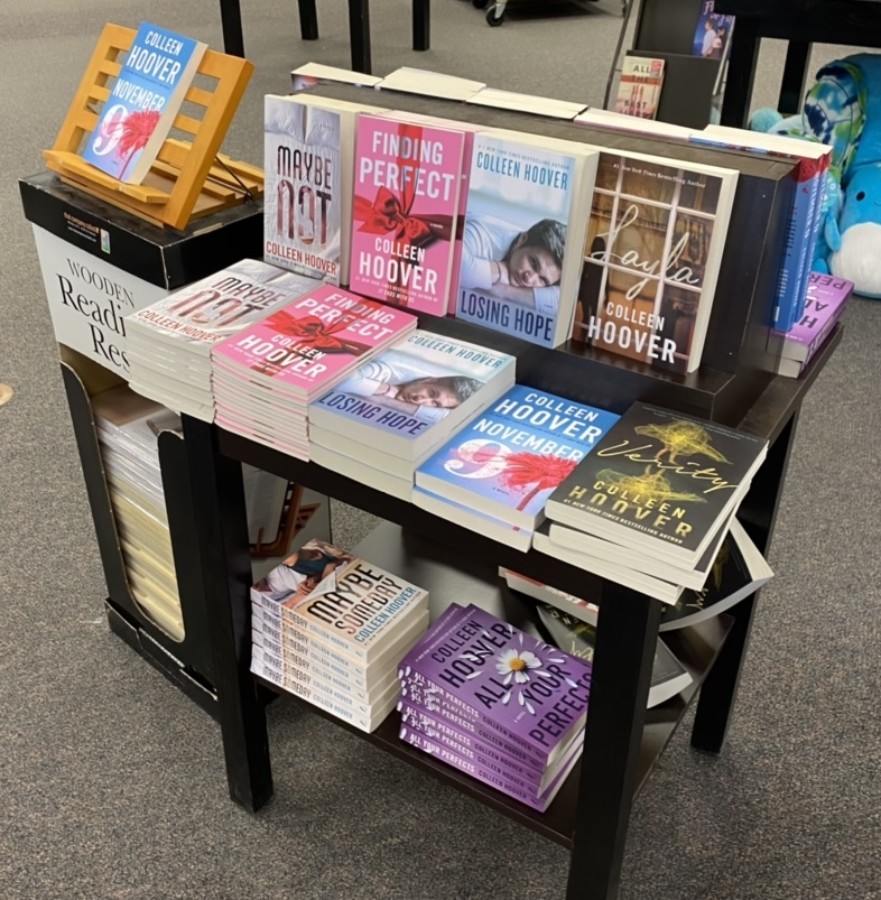Online communities such as Youtube, Instagram and Goodreads once dominated book-reviewing platforms. COVID-19 switched the narrative. In the early stages of the pandemic, TikTok emerged as a new forum for quick book recommendations.
Using #Booktok, creators are able to share videos of book suggestions to millions of users. This new form of discussion has led to over 70 billion views under the hashtag in less than two years. Booktok has also translated online popularity into real life success for previously disregarded authors.
Contemporary romance writer Colleen Hoover has profited the most from this trend.
With twenty-eight books falling under the romance genre, she dominates this TikTok subcommunity. Her books also address mature topics, but misrepresent the reality of relationships that involve domestic abuse and sexual assault.
Hoover’s fanbase is predominantly made up of impressionable women 16-30 years old. This demographic, blind to the toxic ideals her books promote, voices its praise for the endless plot twists and emotional storylines.
Senior Katelyn Larsen was first subjected to Colleen Hoover through Booktok during quarantine. “I was bored during the summer and scrolling through TikTok. Eventually, videos like ‘Top 5 Colleen Hoover Books’ took over my for you page, which is why I decided to read ‘It Ends With Us’,” Larsen said.
Hoover’s most acclaimed novel, “It Ends With Us,” follows the story of Lily Bloom and her struggle to escape the cycle of domestic abuse. After leaving her hometown, Lily meets Ryle, a neurosurgeon, whom she falls for instantly. Seeming perfect at first, Ryle uses his charm to draw Lily in, but it is not long after that his short temper is unveiled.
On one hand, “It Ends With Us” has raised awareness for domestic violence, but on the other, it’s imperative to recognize the negative implications that this book has on her younger audience.
Throughout the book, Hoover develops antagonist Ryle’s character under a victim blaming lense. Her writing fails at finding a balance between evoking sympathy and drawing awareness to abusive behavior.
Hoover explained her process and personal thoughts at the end of the book. “I didn’t want Ryle to be who he was going to be because I had fallen in love with him in those first several chapters, just as Lily had fallen in love with,” she wrote.
Although readers can easily identify him as the antagonist, Lily tries to convince herself and readers that Ryle has “so much more good in him than bad,” even after hitting her to the ground and pushing her down the stairs.
Hoover romanticized Ryle’s abuse, enforcing the idea that there is lust and passion behind abusive relationships.
Senior Makenna Leiby was left disturbed after finishing “It Ends With Us.” “The book wasn’t necessarily unenjoyable, but there were a few parts that made me uncomfortable. Most importantly the depictions of abuse within the book and the subtle hints of forgiveness towards the abuser,” she said.
Though the novel is a work of fiction, messages in “It Ends WIth Us” and other Hoover books can be easily misconstrued because of poor character portrayal. Readers extract the best parts of characters, glorifying them to a dangerous level.
Larsen recognized this glorification on TikTok. “I’ve seen a lot of mixed things about Ryle, but it’s disgusting to see people discuss his character in a positive light. In a book like ‘It Ends With Us’, the outcome and message should not leave readers questioning the morality of characters,” she expressed.
The misleading traits of Hoover’s characters have indoctrinated a whole generation of teenage girls, her primary audience. Girls have begun conforming their idea of the “ideal partner” to the characteristics Hoover praises in her defective male leads. This new genre of “literature” is fueled by exploiting toxic relationships as a source of entertainment.
In the media it’s not uncommon for young females to sexualize and worship fictional men. The consequences of “It Ends With Us” and similar books have become apparent when readers fail to isolate abusers from ideal fictional men.
Readers who can easily identify Ryle as the villain voice can also see the conflicting messages in Hoover’s books. “She made it seem like the good parts outweighed the bad,” Larsen concluded. Leiby expressed similar concerns. “Young women are highly impressionable and Hoover’s depictions of relationships are unrealistic and, a lot of the time, unhealthy.”
Though it is natural for entertainment to evolve with current culture, it’s not natural to glorify abuse. As adolescent girls have become infatuated with romanticized realities, the line between reality and fiction has been blurred.










